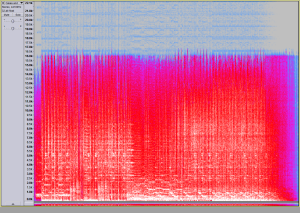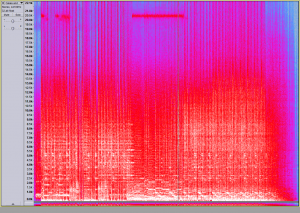Difference Between MP3 and FLAC
MP3 vs FLAC

Spectogram MP3

Spectogram FLAC
There are a number of formats that you can choose from when you want to rip your CDs. MP3 is the most popular format while FLAC (Free Lossless Audio Codec) is a less known alternative. The main difference between the two is in how they compress the audio information. MP3 is a lossy format where parts of the audio information that people are not likely to hear are discarded. On the other hand, as the name suggests, FLAC is lossless. Meaning that it would retain all the information of the audio and none is discarded.
The biggest consequence of the lossy/lossless difference is the size of the corresponding size. Although both are significantly smaller than uncompressed audio, MP3 files are very likely to be around 20% the size of their equivalent FLAC files. This is very important in portable devices where space is often a major issue. The main advantage of FLAC is nothing is lost no matter how many times you compress and uncompress the file. With MP3 the sound quality would begin to deteriorate due to the way the algorithm works.
The small file size of MP3 is also one of the major factors why it has become very popular. It was the codec of choice when the first SSD music players appeared; dubbed as MP3 players. Even today, MP3 is still the very popular and almost all devices that are able to play digital music are able to recognize MP3 files and play them. With FLAC, the number of devices with the ability to play FLAC files is very small. The ability to play FLAC files is often seen only on high end devices where sound quality can truly be appreciated.
Another aspect where the two formats differ is in the royalties. Although MP3 is widely used, very few know that it is a proprietary format and payment of royalties is necessary for the usage of this format. People need not fret though as it is the manufacturer of the device that pays for the royalties of using the MP3 format. FLAC is royalty-free software that anyone can use without paying for. The author intended it to be free from the very start.
Comparison of the size of the files (size of the 4 min. song)
Original WAV file — 40 MB (approx size of 4 min song)
FLAC size — 20 MB
MP3 (128 kbps constant-bit-rate) — 4 MB
Summary:
1. MP3 is a lossy encoding algorithm while FLAC is a lossless encoding algorithm
2. MP3 files are likely to be 20% of the size of the same file encoded with FLAC
3. MP3 has wider hardware support compared to FLAC
4. MP3 is a proprietary format while FLAC is royalty free
- Difference Between Sony Cybershot S Series and W Series - December 22, 2012
- Difference Between Samsung Galaxy S3 and iPhone 5 - December 21, 2012
- Difference Between Samsung Galaxy S2 (Galaxy S II) and Galaxy S 4G - December 20, 2012

You forget to add comparisons:
Original WAV file — 40 MB (approx size of 4 min song)
FLAC size — 20 MB
mp3 (128 kbps constant-bit-rate) — 4 MB
What’s the likelihood of actually hearing a difference?
The differences are only perceptible if you are using high-end audio playback equipment. MP3 files below 256kpbs usually sound worse even on cheaper playback equipment. FLAC files sound pretty well near like the WAV file.
Please disregard the above reply by N.M. – like many people before and, I’m sure, after him, he obviously doesn’t know what he is talking about.
I have just downloaded an album, one as an mp3 and then downloaded the same album as a flac file. I have then listened to both downloads and the diference is noticeable, the flac file is so much and clear and realy crisp. I think I will download more flac files and will realy work out which is better for doing discos.
very helpful and very well explained to full.
thank you,so much.